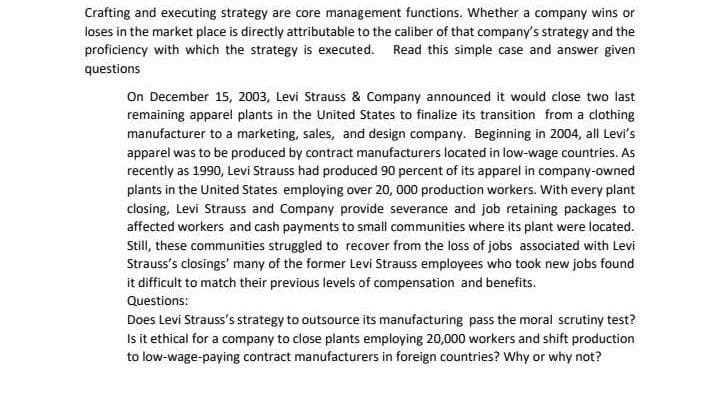On December 15, 2003, Levi Strauss & Company announced it would close two last remaining apparel plants in the United States to finalize its transition from a clothing manufacturer to a marketing, sales, and design company. Beginning in 2004, all Levi's apparel was to be produced by contract manufacturers located in low-wage countries. As recently as 1990, Levi Strauss had produced 90 percent of its apparel in company-owned plants in the United States employing over 20, 000 production workers. With every plant closing, Levi Strauss and Company provide severance and job retaining packages to affected workers and cash payments to small communities where its plant were located. Still, these communities struggled to recover from the loss of jobs associated with Levi Strauss's closings' many of the former Levi Strauss employees who took new jobs found it difficult to match their previous levels of compensation and benefits. Questions: Does Levi Strauss's strategy to outsource its manufacturing pass the moral scrutiny test? Is it ethical for a company to close plants employing 20,000 workers and shift production to low-wage-paying contract manufacturers in foreign countries? Why or why not?
On December 15, 2003, Levi Strauss & Company announced it would close two last remaining apparel plants in the United States to finalize its transition from a clothing manufacturer to a marketing, sales, and design company. Beginning in 2004, all Levi's apparel was to be produced by contract manufacturers located in low-wage countries. As recently as 1990, Levi Strauss had produced 90 percent of its apparel in company-owned plants in the United States employing over 20, 000 production workers. With every plant closing, Levi Strauss and Company provide severance and job retaining packages to affected workers and cash payments to small communities where its plant were located. Still, these communities struggled to recover from the loss of jobs associated with Levi Strauss's closings' many of the former Levi Strauss employees who took new jobs found it difficult to match their previous levels of compensation and benefits. Questions: Does Levi Strauss's strategy to outsource its manufacturing pass the moral scrutiny test? Is it ethical for a company to close plants employing 20,000 workers and shift production to low-wage-paying contract manufacturers in foreign countries? Why or why not?
Management, Loose-Leaf Version
13th Edition
ISBN:9781305969308
Author:Richard L. Daft
Publisher:Richard L. Daft
Chapter8: Strategy Formulation And Execution
Section: Chapter Questions
Problem 2EE
Related questions
Question

Transcribed Image Text:Crafting and executing strategy are core management functions. Whether a company wins or
loses in the market place is directly attributable to the caliber of that company's strategy and the
proficiency with which the strategy is executed. Read this simple case and answer given
questions
On December 15, 2003, Levi Strauss & Company announced it would close two last
remaining apparel plants in the United States to finalize its transition from a clothing
manufacturer to a marketing, sales, and design company. Beginning in 2004, all Levi's
apparel was to be produced by contract manufacturers located in low-wage countries. As
recently as 1990, Levi Strauss had produced 90 percent of its apparel in company-owned
plants in the United States employing over 20, 000 production workers. With every plant
closing, Levi Strauss and Company provide severance and job retaining packages to
affected workers and cash payments to small communities where its plant were located.
Still, these communities struggled to recover from the loss of jobs associated with Levi
Strauss's closings' many of the former Levi Strauss employees who took new jobs found
it difficult to match their previous levels of compensation and benefits.
Questions:
Does Levi Strauss's strategy to outsource its manufacturing pass the moral scrutiny test?
Is it ethical for a company to close plants employing 20,000 workers and shift production
to low-wage-paying contract manufacturers in foreign countries? Why or why not?
Expert Solution
This question has been solved!
Explore an expertly crafted, step-by-step solution for a thorough understanding of key concepts.
Step by step
Solved in 2 steps

Recommended textbooks for you

Management, Loose-Leaf Version
Management
ISBN:
9781305969308
Author:
Richard L. Daft
Publisher:
South-Western College Pub


Management, Loose-Leaf Version
Management
ISBN:
9781305969308
Author:
Richard L. Daft
Publisher:
South-Western College Pub
